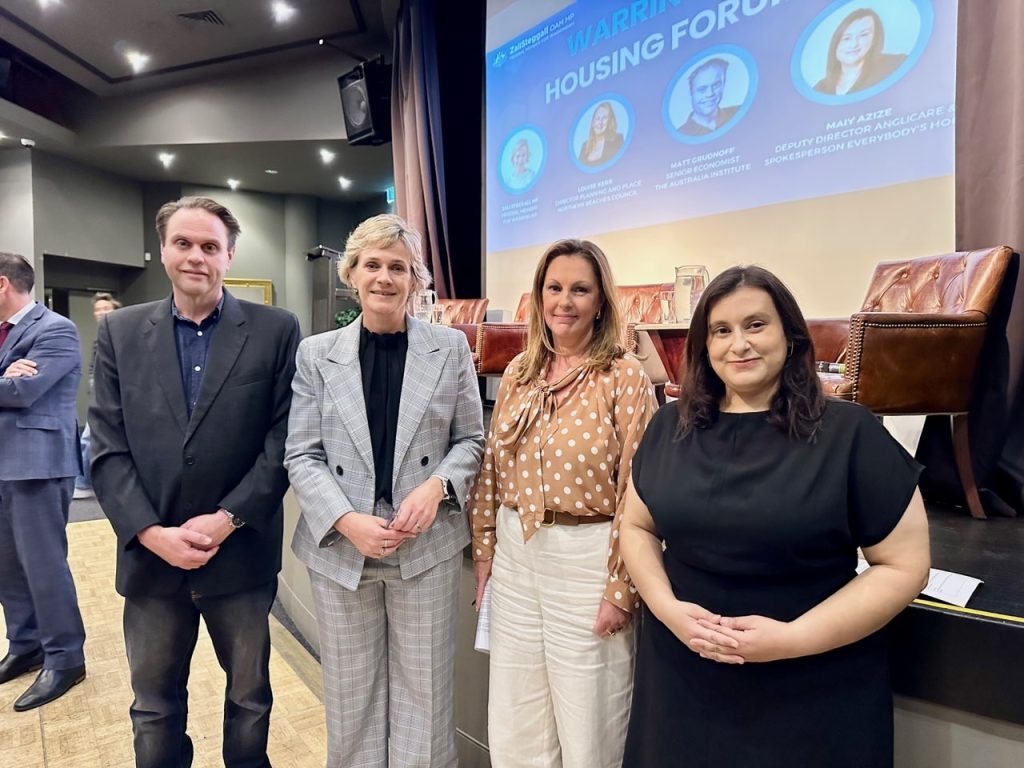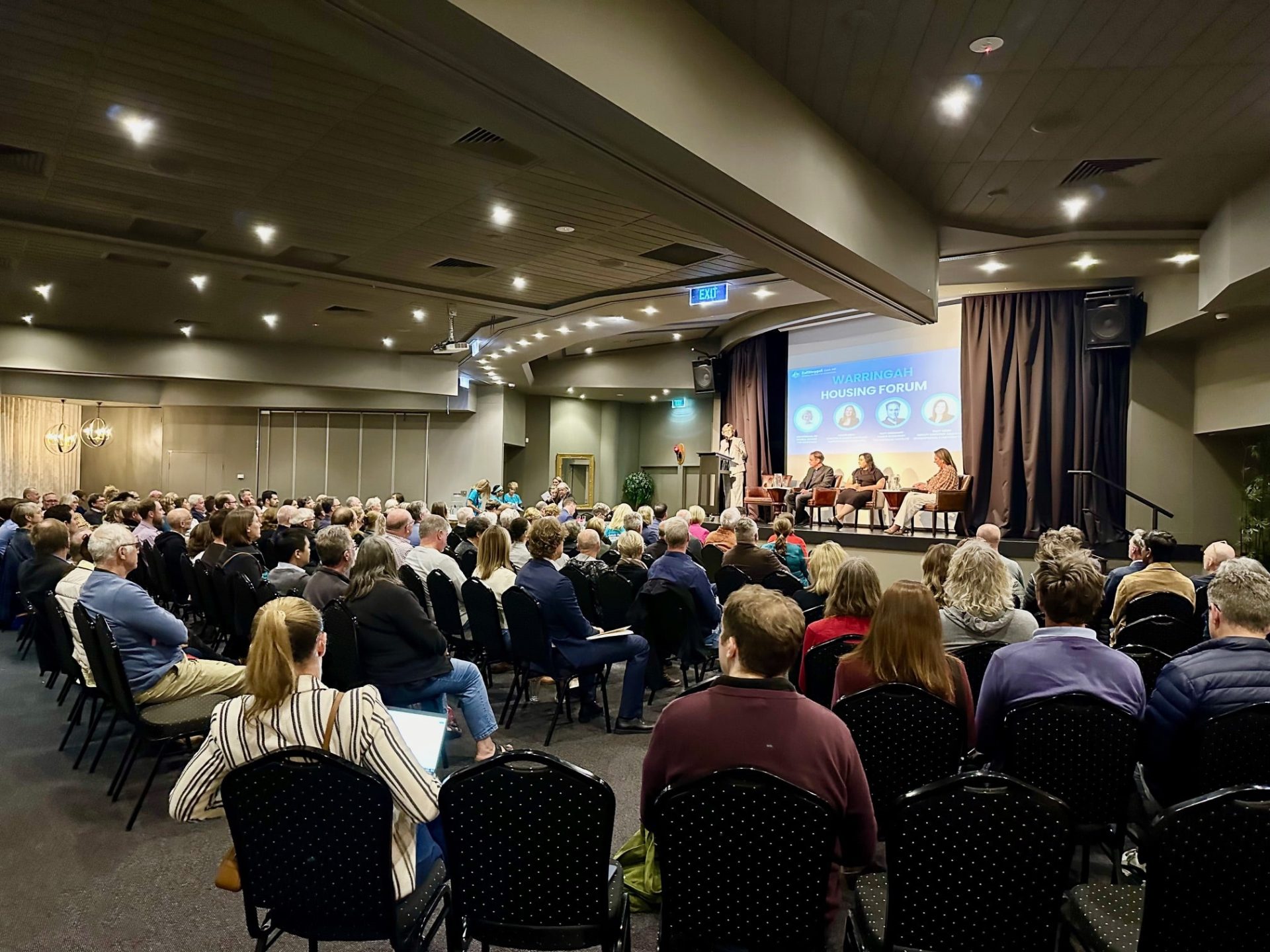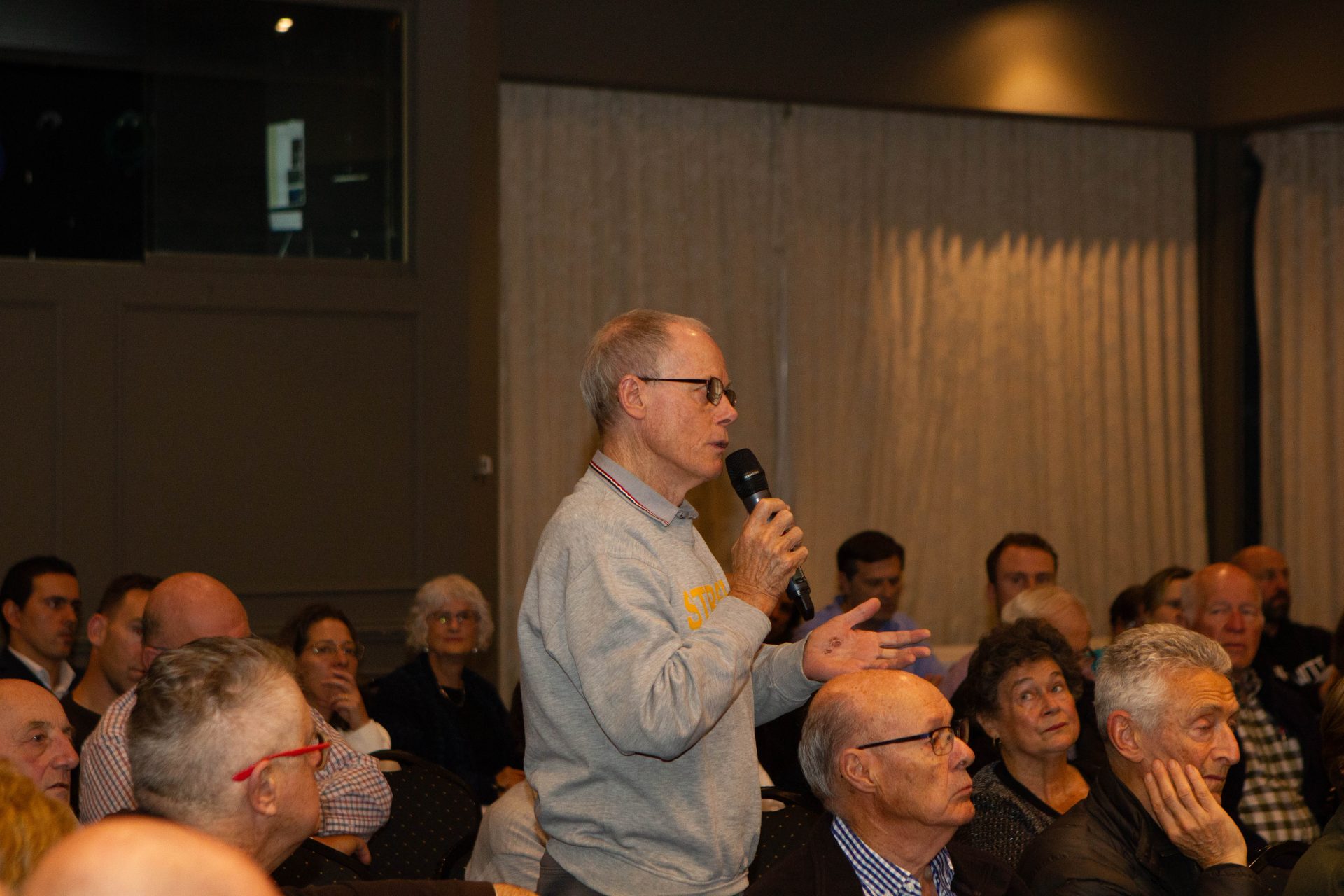A housing forum was held for the Warringah electorate (lower Northern Beaches and Mosman) last week. Here’s a recap on what was discussed.
Organised by Federal Member for Warringah, Zali Steggall, the forum was held at Balgowlah RSL on Wednesday 2 October; the room was packed.
The forum included a panel: Louise Kerr, Director Planning and Place for Northern Beaches Council, Maiy Azize, Deputy Director Anglicare Australia, and Matt Grudnoff, Senior Economist, The Australia Institute. They faced an audience that were primarily homeowners (either with a mortgage or who owned their home outright), and only about five per cent renters.

It took the panel around 90 minutes to answer 100 pre-submitted questions (grouped into common themes). Ms Steggall said she was happy with the robust discussion.
She told Manly Observer that the two main areas that jumped out to her were looking at ways to increase supply of homes on the Northern Beaches and decreasing competition in the housing market to make way for young people to go from renters to homeowners. (You can read our interview with Ms Steggall on her concerns around the Housing Crisis here.)
A few key issues were raised:
The diversity in our community is negatively affected by the housing crisis
Essential workers don’t earn enough to be able to live here and that translates into them working in other areas of Sydney and NSW while Northern Beaches services are left understaffed.
“Over the last 10 years, we’ve seen a constant loss of essential workers [from the Northern Beaches]. We can’t build a strong, vibrant economy, when we have a significant shortage of social and affordable housing,” Ms Kerr said.

Ms Steggall pointed to the major transport crisis where there weren’t enough bus drivers to operate the bus services on the Northern Beaches as they couldn’t afford to live here and, instead, lived and worked in more affordable areas of the state (we reported on this earlier this year, which you can read here).
“Many of our local police force live on the Central Coast and they have to commute to service in Northern Beaches. Now, that’s not ideal as a community,” she added.
“And aged care workers are having to hot bed to be able to do their shifts.”
“aged care workers are having to hot bed to be able to do their shifts.”
It was argued that this proved the local need for affordable social housing, not just for those in crisis, homeless situations.
“One of the reasons we see objections to social housing is because it has become seen as a safety net for those people at the absolute margins, instead of for members of the community who benefit that community with their employment,” Anglicare’s Ms Azize explained.
Rebecca Pinkstone, Chief Executive of Homes NSW, who was a member of the audience that evening, added that in the Northern Beaches, there are 3,000 people on the Housing Register, and 1,000 of those are a priority need – people who are homeless, escaping domestic violence or older women.
“That’s not even touching the workforce issues that we’ve talked about,” she said.
Homes NSW has been allocated $6.6 billion to invest in social and affordable housing, however Pinkstone said it would ‘barely touch’ the 57,000 people in NSW on the housing register.
Policies to get young people into the market aren’t working
Renters are staying renters much longer than in previous years, which is putting pressure on the rental market.
“Young people are renting in a sector that’s pretty unregulated,” Ms Azize said.
“They can face a 20 per cent increase at the end of their 12-month lease, so they can’t plan to save and when they have eventually scraped enough for a deposit, they are entering a market that’s overheated.”
Not only do we need to make the rental market more regulated, according to the panel, we also need to rethink schemes offered to first home owners.
“Unfortunately, most of those schemes designed to get first home buyers into the housing market just make housing less affordable, they just push up housing prices,” Mr Grudnoff said.
He explained that any additional funding supplied gives the home buyers an ability to increase their bidding at the auction, lining the pocket of the seller, instead of benefiting the purchaser.
Instead, he said we need to consider ways to reduce the number of people at auctions, in other words, reduce the competition.
Reviewing the tax system
Discussion turned to the Capital Gains Tax discount, which was introduced over 20 years ago to reduce how much tax is paid when selling a home if you have lived in it for at least a year. In fact, it’s halved.
You don’t pay any tax on the profit from the sale of your home, and capital gains are added to your income tax.
Mr Grudnoff – the panellist from the Australia Institute – explained that no other profit gained from investments are taxed in this way and it incentivises investors to have more than one investment property. He added that in order to reduce the number of investors at an auction (which helps to reduce competition), the government needs to reconsider the Capital Gains Tax.
“The Capital Gains Tax discount and Negative Gearing are worth just over $20 billion a year,” Mr Grudnoff explained.
Negative gearing allows investors to deduct losses from investment properties – that is, if their expenses exceed the rent collected from the home – from other taxable income, reducing their tax bill in the process, it’s explained cleanly in this article by the Guardian.
Critics say the benefit stokes housing demand, raising prices for all. Supporters say the sector gets more investment than it otherwise would, making it more attractive for builders and increasing the supply of rental properties.
Mr Grudnoff, an economist, argued the lucrative benefits were some of the key areas requiring change.
“The Labor government, through their housing fund, are proposing to spend half a billion dollars a year on housing, so 40 times that is what we’re spending on these tax concessions. They’re enormous, and unfortunately, they’re making housing less affordable,” he said.
“If we were to cut back on those, not only would housing be more affordable, but we would also have billions and millions of dollars to put into building more social and affordable housing, and also put that into building community infrastructure.”

We aren’t using our land effectively
A member of the audience claimed that the problem isn’t housing prices, they’ve been fairly stagnant ever since the COVID boom. The issue is Council is not effectively using the land we have.
She highlighted Council’s policy on dual occupancy, which states that “attached dual occupancy development will be permitted in the R2 Low Density Residential zone throughout the LGA with a minimum allotment size of 800sqm and 18m site frontage”. She claimed the average lot size in our area is 600 sqm.
Another issue brought to the panel’s attention is we aren’t using our back gardens effectively. Northern Beaches resident, Colleen O’Brien, has been advocating for the government to incentivise building granny flats.
In her report that she showed Manly Observer, Northern Beaches is the second largest LGA with the highest number of suitable backyards and we could squeeze in over 7,000 granny flats.
Ms O’Brien said that granny flats provide multiple benefits including their fast construction, a 20 to 30 per cent return per annum for the home owner, increasing rental supply, parents ability to assist adult children to save for their first home, and adult children’s ability to care for their elderly parents decreasing the strain on the aged care sector. To make this a reality, O’Brien advocates for removing Capital Gains Tax which would be triggered by renting out the granny flat and re-defining taxation on the income derived from renting a granny flat.
Manly Observer understands that permitting pro granny flats is one of the measures in Council’s proposed new Local Environment Plan, to be considered later this year.
What are some of the things the Northern Beaches Council are doing?
Ms Kerr (from Northern Beaches Council) explained that on the Northern Beaches there is capacity for new homes, however, there are concerns that the State Government is looking to impose planning changes that allow for rapid growth without funding the infrastructure needed to support the increased population.

For example, in the Brookvale Structure plan (this is essentially a 15 year outline), there is capacity to build 1,350 new dwellings, however in a submission to Department of Planning, Housing and Infrastructure, Council stated Transport NSW has not committed to grade separation of traffic at the intersection of Warringah and Pittwater roads (which would be needed with the increase in population in that area).
(Editor’s note: It could also be noted that this plan had a recommended reduction of enforced affordable housing percentage in order to make it a ‘viable’ for investors. Council has a recommended 10 per cent requirement of affordable housing for new builds. This plan suggests just 5 per cent).
“Likewise, with the French’s Forest precinct, we’re waiting to see if the State Government sells the land, and our capacity could double (from 2,000 homes to 4,000 homes) and we would need infrastructure like the Beaches Link,” Ms Kerr added.
Beaches Link refers to the now cancelled and controversial Northern Beaches Tunnel project.
Member for Wakehurst, Michael Regan, who was in the audience, added that there is a plan to build 1,000 affordable units at the old French’s Forest Highschool site.
“The high school opens next year in June and frees up that site, and it’s only a Development Application, it doesn’t have to be rezoned,” he said.
“We’re working with the Treasurer, with the Minister for Housing, and the Premier.”
Council’s concerns have extended beyond infrastructure, however. When planning proposals were first mooted by NSW Government earlier this year, Council expressed its concern that the proposals impose risks to the native environment and reduce wildlife diversity by removing trees.
A tension between environmental protection and housing need increases as both areas become increasingly vulnerable.
“Housing should be a basic human right, and government should have quotas to deliver this human right and be accountable if they don’t.”
It’s a basic human right
During question time, Alan Clarke, Founder of Street Mission, said, “housing should be a basic human right, and government should have quotas to deliver this human right and be accountable if they don’t.”

If you’d like to watch a video recording of the event, you can view it here.
Written by Avi Vince with additional information and edits by Kim Smee



